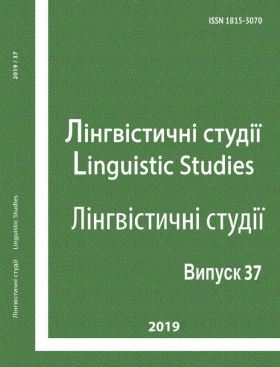Lexicographic Description of the Functional Wealth of Personal Pronouns (using ти – ви Opposition as an Example).
DOI:
https://doi.org/10.31558/1815-3070.2019.37.5Keywords:
lexicographical description, deictic word, pronoun, personal pronoun, interpretation of pronouns, opposition ти – ви, polite ви, pragmatic information in a dictionaryAbstract
The lexicographic description of personal pronouns of the Ukrainian language never was the subject of a special study. However, practice shows that their functional presentations are only partially given in definition dictionaries and inconsistently interpreted. In addition, a systematic approach to the presentation of deictic words, in general, is poor.References
Apresjan, Juriy. Izbrannyje trudy. T. 2: Integralnoe opisanie jazyka i sistemnaja leksikografija (Selected Works. T. 2: Integral language description and systemic lexicography). Moskva: Jazyki russkoj kultury, 1995. Print.
Benvenist, Jemil. Obshhaja lingvistika (General linguistics). Moskva: Editorial URSS, 2002. Print.
Bulygina, Tatjana and Shmeljov, Aleksej. Jazykovaja konceptualizacija mira (na materiale russkoj grammatiki) (Language Conceptualization of the World (on the material of Russian grammar). Moskva: Jazyki russkoj kultury, 1997. Print.
Byuler, Karl. Teorija jazyka. Reprezentativnaja funkcija jazyka (Theory of Language. The representational function of language). Moskva: Progress, 2000. Print.
Graneva, Irina. Mestoimenie my v sovremennom russkom jazyke: kommunikativno-pragmaticheskij podhod (The pronoun мы in modern Russian: communicative-pragmatic approach). Diss. Lobachevsky University of Nizhni Novgorod, 2009. Abstract. Web. 14 Feb. 2019.
Graneva, Irina. “O referentnom i nereferentnom upotreblenii mestoimenija my (On the reference and non-referential use of the pronoun мы)”. Vestnik Nizhegorodskogo universiteta im. N. I. Lobachevskogo. Filologija. Iskusstvovedenie (Vestnik of Lobachevsky University of Nizhni Novgorod. Philology. History of Art) 4 (2008): 206–209. Web. 14 Feb. 2019.
Grimm, Jacob. Über den Personenwechsel in der Rede. Berlin: Königl. Akademie der Wissenschaften, 1856. Web. 1 Feb. 2019.
Himik, Vasilij. Kategorija subjektivnosti i ejo vyrazhenie v russkom jazyke (Category of the subjectivity and its expression in Russian). Leningrad: Izd-vo Leningradskogo un-ta, 1990. Print.
Hoarţǎ Cǎrǎuşu Luminiţa. “Pragmatische Funktionen des Pronomens im aktuellen rumänischen Sprachgebrauch”. Philologika Jassyensia. An VI, № 2(12) (2010): 31–40. Web. 1 Feb. 2019.
Houtzagers, Peter. The honorific third person plural in Slavic. Russian Linguistics. 42(1) (2018): 1–26. Web. 5 Feb. 2019.
Mejzerska, Iryna. “Pryncypy organizaciyi mikrostruktury slovnykovoyi statti v anglijskyh navchalnyh tlumachnyh slovnykax (Principles of organization of the microstructure of the vocabulary article in the English educational explanatory dictionaries)”. Naukovyj visnyk kafedry Yunesko KNLU. Seriya Filologiya. Pedagogika. Psyhologiya (Scientific bulletin of the Department of UNESCO. Philology. Pedagogy. Psychology) 30 (2015): 42–48. Print.
Novyj tlumachnyj slovnyk ukrayinskoyi movy (New Explanatory Dictionary of the Ukrainian Language). Ed. by Vasyl Yaremenko, Oksana Slipushko. Kyiv: Akonit, 1999. Print.
Ponomarenko, Volodymyr. “O. O. Potebnya i problema stanovlennya form uvichlyvosti u shidnoslovyanskyh movah (O. O. Potebnya and the problem of the formation of forms of politeness in the East Slavic languages)” Komparatyvni doslidzhennya slovyanskyh mov i literatur (Comparative studies of Slavic languages and literatures). Kyiv: Osvita Ukrayiny, 2010. 104–109. Print.
Ponomarenko, Volodymyr. “Vtorynna nominaciya u zajmennykovij sferi (Secondary nomination in the pronoun sphere)” Indoyevropejska spadshhyna v leksyci slovyanskyh, baltijskyh, germanskyh i romanskyh mov: semantychni ta slovotvirni zvyazky i procesy (Indo-European heritage in the vocabulary of Slavic, Baltic, Germanic and Romanesque languages: semantic and word-formation ties and processes). Kyiv: Vydavnychyj dim Dmytra Burago, 2013, 482–554. Print.
Rеу, Alain and Dеlеsаllе, Simone. “Problemy i antinomii leksikografii (Problems and antinomies of lexicography)”. Novoe v zarubezhnoj lingvistike (New in foreign linguistics) ХІV Problemy i metody leksikografii (Problems and methods of lexicography) (1983): 261–300. Print.
Slovnyk ukrayinskoyi movy (Dictionary of the Ukrainian Language): V 11-ty t. Kyiv: Naukova dumka, 1970−1980. Print.
Uspenskij, Boris. Ego Loguens: Jazyk i kommunikacionnoe prostranstvo (Ego Loguens: Language and Сommunication Space). Moskva: Russian State University for the Humanities, 2007. Print.
Yasakova, Nаtaliya. Katehoriya personalnosti: pryroda, struktura ta reprezentatsiya v ukrayinskii literaturnii movi (The Category of Personality: Nature, Structure, and Representation in the Ukrainian Literary Language). Kyiv: National University of “Kyiv-Mohyla Academy”, 2016. Print.


